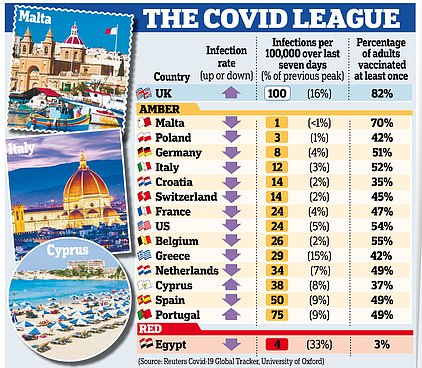Massive testing drive in Scotland to blame for UK hitting ANOTHER four-month infection high with cases soaring to 16,135, deaths doubling in a week to 19 and hospitalisations rising by a fifth
- Department of Health bosses posted 16,135 Covid cases today — up up from the 11,625 recorded yesterday
- No10’s top advisers always warned fatalities would increase as cases go up because vaccines are not perfect
- Number of people checking into hospital with Covid on Saturday increased 19 per cent over a week to 211
Britain’s daily Covid infections hit a four-month high today, despite leading scientists and senior ministers insisting the outbreak was finally slowing down.
Department of Health bosses posted 16,135 positive tests, up by almost 80 per cent on last week’s figure and larger than yesterday’s 11,625, which was the worst toll since mid-February.
Today’s infections are at their highest since February 6 (18,262), but health chiefs blamed the massive increase on surge-testing carried out across Scotland to flush out the Indian variant and stop it spreading. Day-to-day figures can fluctuate drastically.
Dr Mary Ramsay, head of immunisation at Public Health England, told a Downing Street press conference tonight that the jump in cases was actually a ‘positive’ because it meant the testing blitz in Scotland was working.
Meanwhile, the explosion in cases throughout June, fuelled by the rapid spread of the mutant strain, is now translating into deaths, with the number of fatalities having doubled in a week. Another 19 victims were registered today, up from nine last week.
Hospitalisations have also risen by a fifth, with pressure growing on the NHS because of the spiralling outbreak over the past month.
But the true state of Britain’s crisis remains a mixed picture, with top scientists — including ‘Professor Lockdown’ Neil Ferguson — and senior ministers hailing ‘encouraging’ data this week that showed the speed of the outbreak was decelerating, that the third wave was more like a ‘bump’ and the worst of the crisis was ‘over’.
Separate promising NHS statistics today showed pressure on hospitals was also beginning to slow down, even though the actual number of infected patients needing medical treatment is still increasing.
No10 is confident England will be able to unlock fully on July 19, with Boris Johnson preparing to axe virtually all curbs next month and make a huge push back towards normality. Social distancing, face masks and work-from-home guidance are all set to be ditched, and fully vaccinated Brits may be able enjoy quarantine-free holidays.
It comes as Britain hit a major milestone in its vaccination campaign today, with 60 per cent of adults now fully vaccinated against the disease. More than 31.7m over-18s have already had both doses, while 43.4m — or 82.5 per cent — have had their first jab, official statistics show.
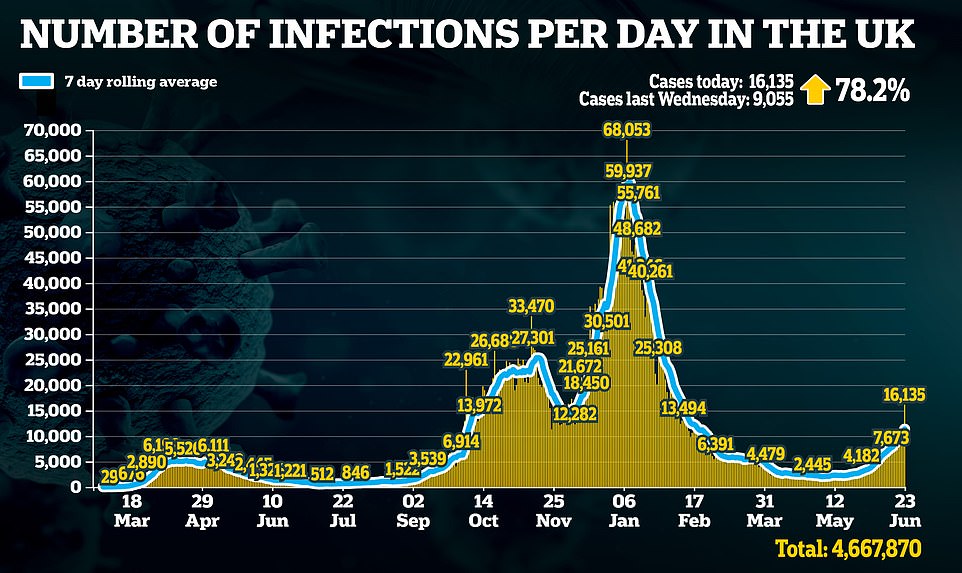
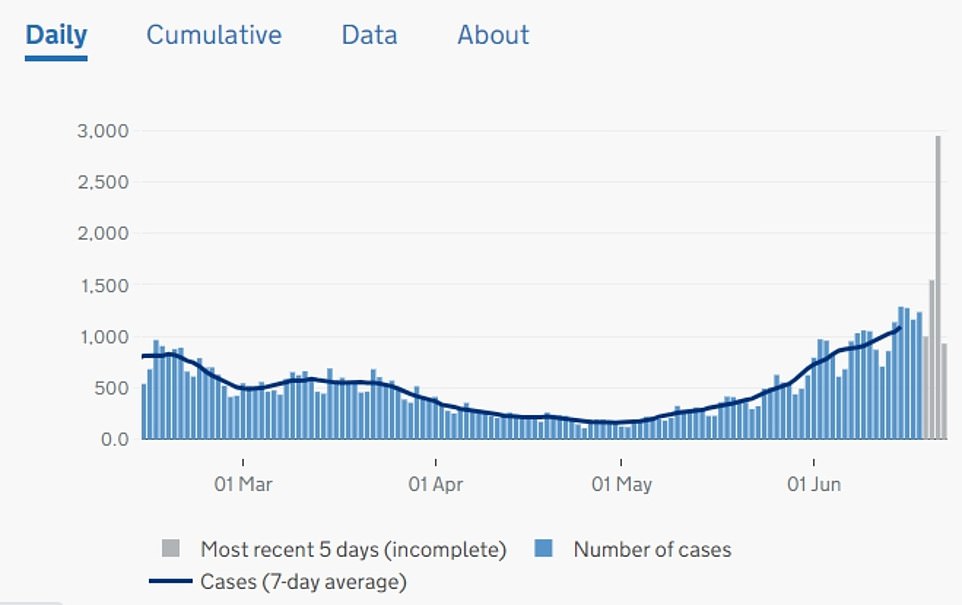
Today’s case-load is the most since February 6 (18,262), but health chiefs blamed the massive increase on surge-testing carried out across Scotland to flush out the Indian variant and stop it spreading. Pictured, a graph showing how cases have increased in Scotland over the past month. Figures in grey are incomplete because of a recording lag
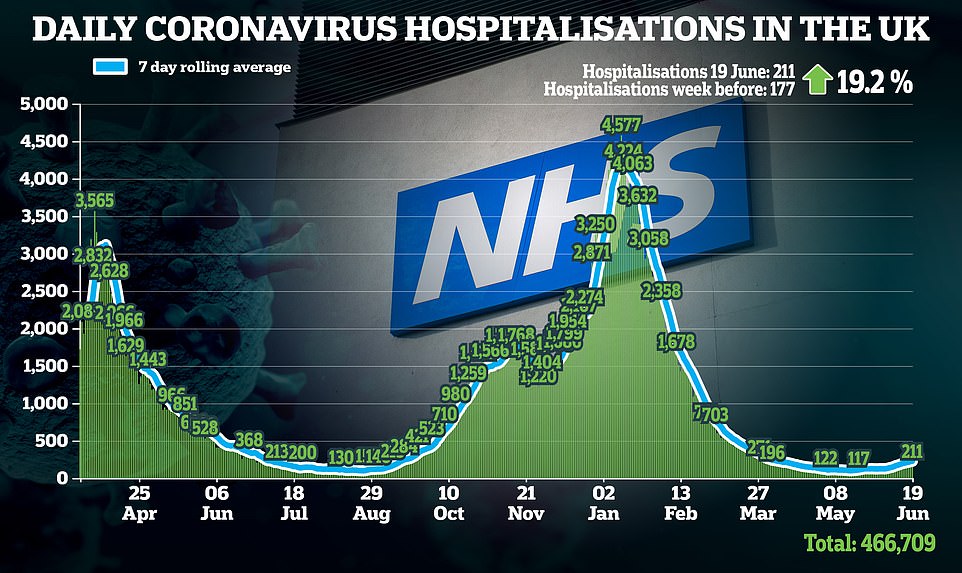
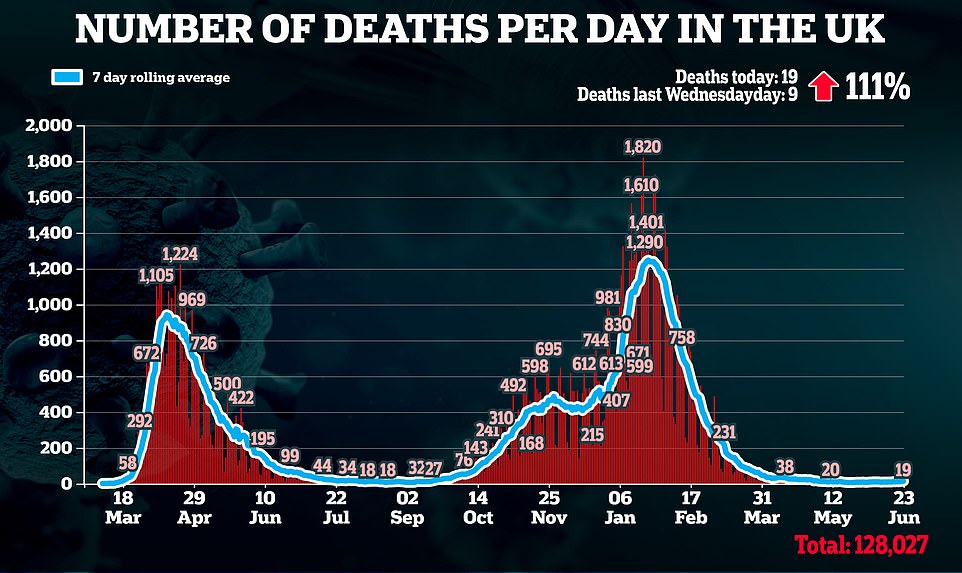
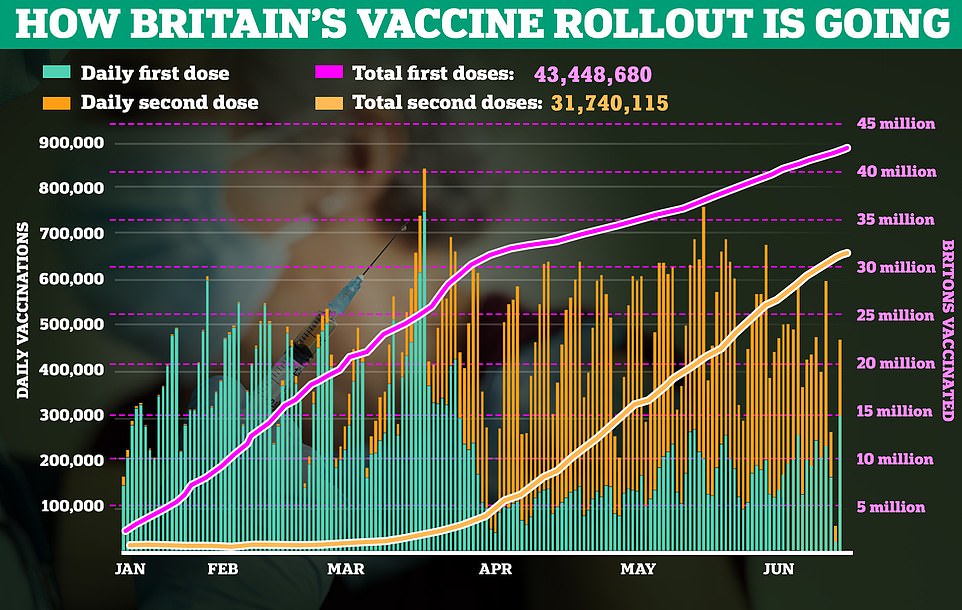
More than 31.7million over-18s have already had both doses, while 43.4million — or 82.5 per cent — have had their first jab, official statistics show
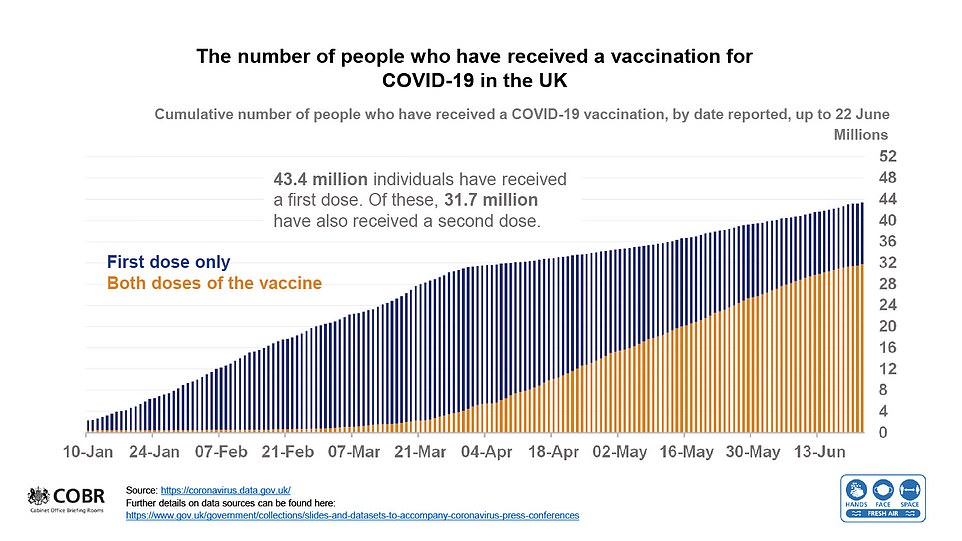
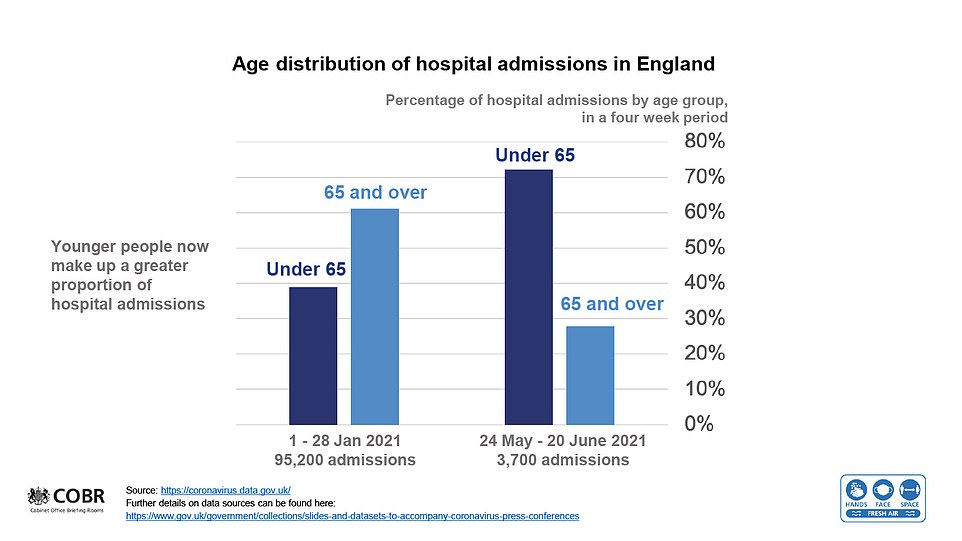
It comes as:
- It emerged today Chinese scientists deleted crucial data from the earliest confirmed Covid patients amid intense scrutiny about the true origins of the disease;
- Boris Johnson criticised an anti-vaxxer protester today who filmed himself yelling abuse at Jonathan Van-Tam while accusing him of ‘genocide’ and lying to Britons;
- Official figures suggested people working from home spend 45 minutes fewer on their job each day;
- Scientists called for calm over the emergence of the potentially vaccine-resistant ‘Delta plus’ variant, claiming that there are no signs it will take off in the UK;
- Ministers prepared to axe virtually all virtually all curbs on July 19.
Speaking at tonight’s Downing Street press conference, Dr Ramsay pointed to a UK-wide deaths chart and said the numbers ‘are so small on this graph that you can’t even see any increase’.
She said ‘although every death is a terrible tragedy’ the data suggests the vaccination programme is working to suppress serious illness.
On cases, Dr Ramsay attributed the daily figure to surge testing in Scotland.
A total of 42,310 people were tested in Scotland in the previous 24 hours, which is the highest number carried out in Scotland in a single day since the pandemic began. Roughly 7 per cent of tests came back positive.
First Minister Nicola Sturgeon said the unusually high case figures were in part because of increased testing, but she said they should be taken seriously if they continue to grow unchecked.
SAGE member and behaviour expert Professor Stephen Reicher suggested that men meeting up to watch Scotland in the Euro 2020, the country’s first major international football competition in 23 years, was behind the rise.
Meanwhile, almost half of all adults aged 25 to 29 in England and a third of those aged 18 to 24 have received their first dose of a coronavirus jab, according to the vaccines minister.
Nadhim Zahawi defended the Government’s decision to delay the final stage of the road map, as he said the additional four weeks to July 19 would give the NHS more time to get ‘those remaining jabs in arms’.
He told the Downing Street press conference that more than 14,000 lives had been saved by the vaccination programme, while 44,500 hospital admissions had also been averted in England – 2,500 in the past two weeks.
Referring to younger adults coming forward to be vaccinated, he told the press conference: ‘The enthusiasm is making a huge difference.
‘We have already given first doses to almost half of all 25 to 29-year-olds in England and only a week after the programme opened to all adults on Friday, one-third of people aged between 18 and 24 have had their first dose.
‘To all of the young people who have stepped up, I want to say a huge thank you. You have protected yourself, you have protected your families, and you have protected your communities.’
Mr Zahawi said that more than a million people aged over 50 in England had received their second dose in the past two weeks as he defended the delay to the end of restrictions.
He told the press conference: ‘Our mission is now to get as many people protected as we can and to protect them as quickly as we can.
‘Last week we took the difficult but I think essential decision to pause Step 4 in our road map for four weeks with a review of the data after two weeks – and we will absolutely have that review and share the data with the nation.
‘We’re going to use these four weeks to give our NHS that bit more time so we can get those remaining jabs in arms of those who really do need them.’
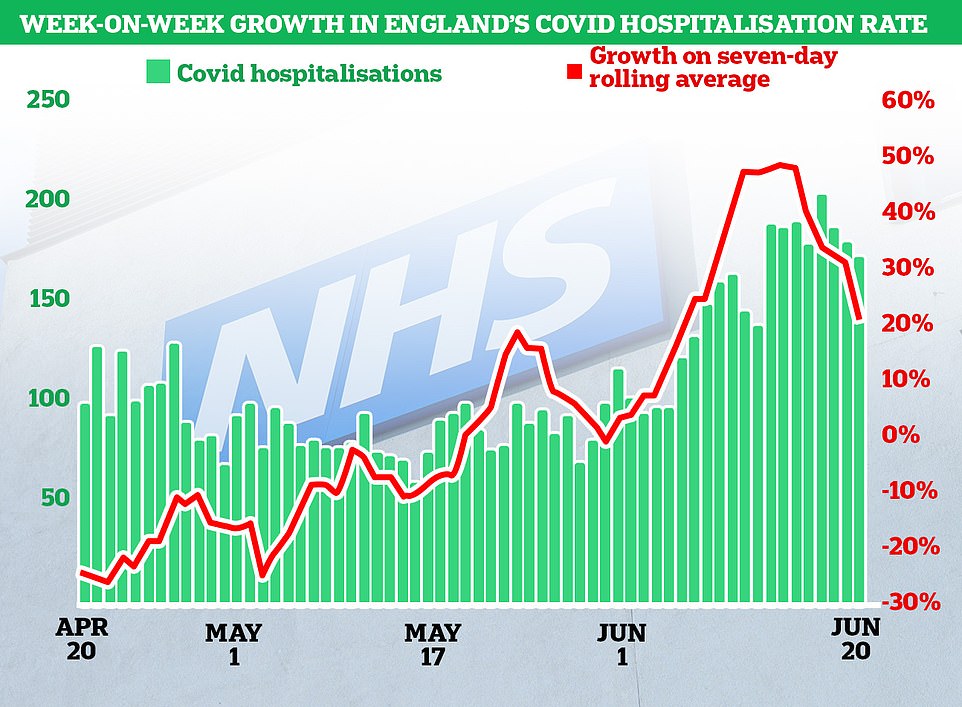
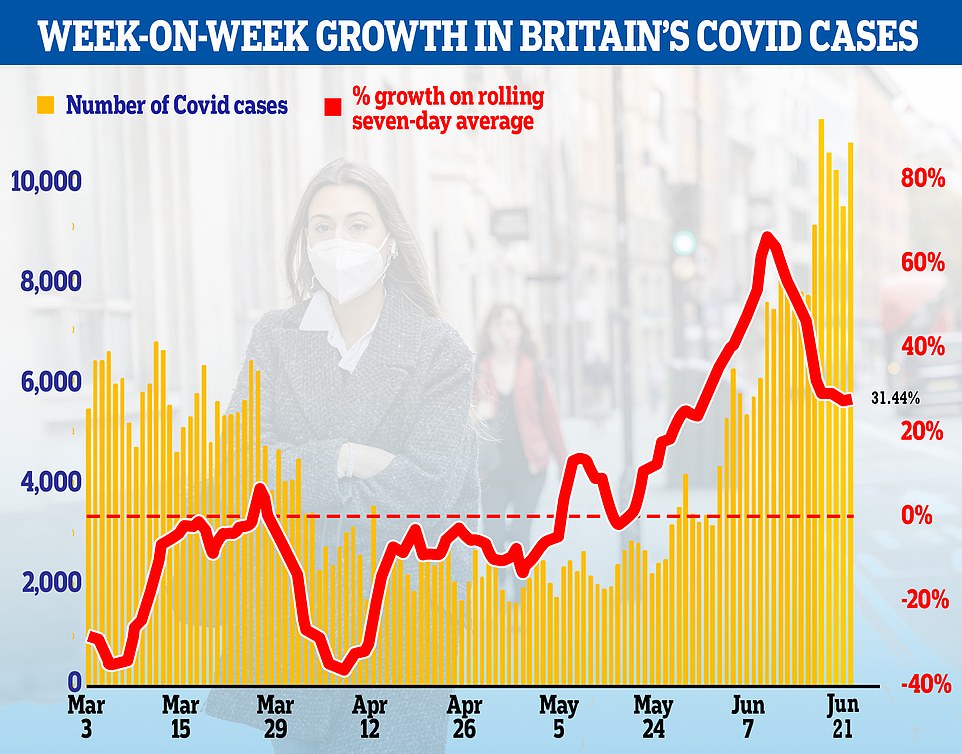
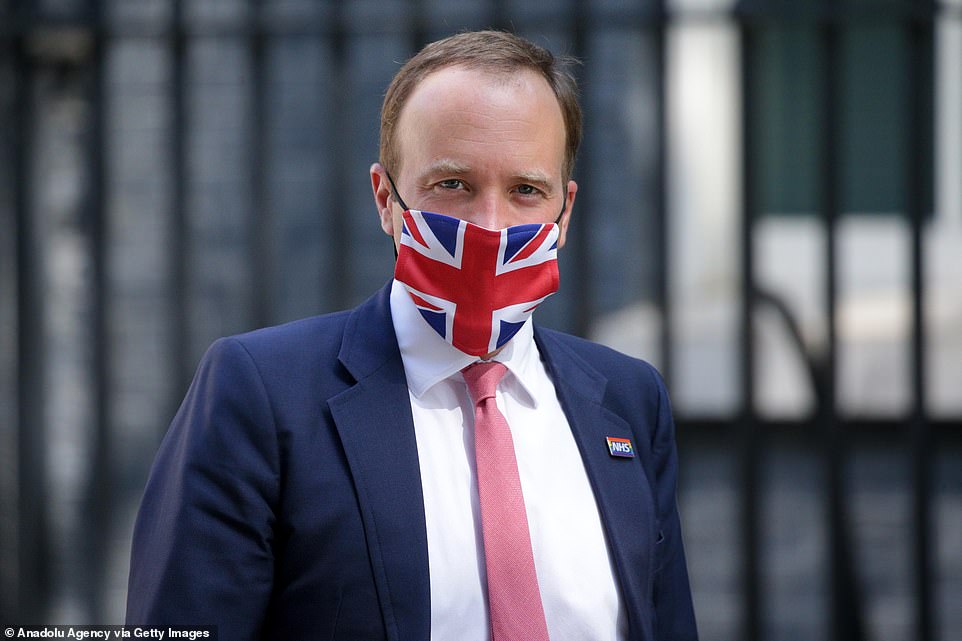
Health Secretary Matt Hancock, pictured leaving 10 Downing Street today, told Radio 4’s Today programme yesterday that the latest hospitalisation and death data was ‘encouraging’ and the country is ‘on track’ for easing restrictions on July 19

The seven-day average of patients admitted to hospital with Covid is rising and hit 183.7 on June 20. But the rate at which this number is increasing has dropped. The number of patients in hospital peaked at 34,336 in January at the peak of the second wave and was falling steadily until it reached 730 in May before beginning to rise as restrictions were eased and the Indian ‘Delta’ variant – which is thought to be 80 per cent more infectious than the Kent mutation – spread across the country

The number of people who have been moved onto a ventilator continues to rise. By June 22, 229 patients were using the machines to help them breathe. In January, the number of patients using ventilators hit 3,736, before dropping to 113.6 in May
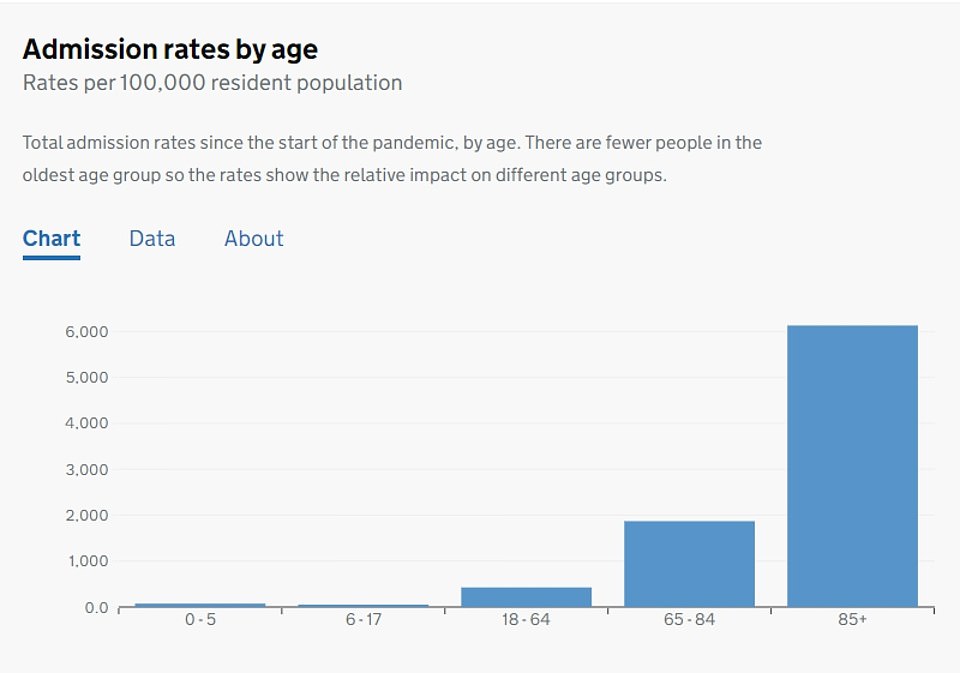
Those aged over 85 have made up the highest proportion of hospital admissions, with 6,129.5 admitted per 100,000 This is followed by 65 to 84-year-olds, with 1,869.2 of them per 100,000 being admitted to the hospital since last March. Meanwhile, 3,005 children aged below five, 2,962 people between six and 17-years-old and 144,289 people aged between 18 and 64 have gone to hospital with the virus

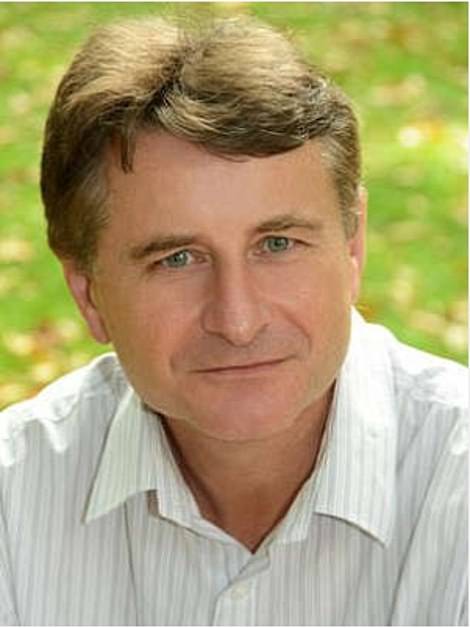
Professor Neil Ferguson said the situation was ‘encouraging’, while Professor Brendan Wren said the third wave felt more like a ‘bump’ and there was a ‘certain amount of coronamania going on’
A Cabinet source told the Mail there was now clear evidence vaccinations were working. ‘It’s all over, even if not everyone in Government has realised it yet,’ the insider said.
Even ‘Professor Lockdown’ Neil Ferguson today said the situation was ‘encouraging’, while another top scientist said the third wave felt more like a ‘bump’ and there was a ‘certain amount of coronamania going on’ and that reopening on July 5 was possible.
Other academics said they are ‘incredibly optimistic’ about the outbreak and ‘don’t see any real need’ to push back Freedom Day again, after the original date of June 21 was delayed by four weeks to ensure millions more adults were fully vaccinated.
However, it is understood there is almost no chance the date will be brought forward to July 5 despite immense pressure from Tory MPs.
The plan to reopen could put England on a significantly different course from Scotland, after Nicola Sturgeon yesterday delayed the latest phase of its loosening for another three weeks and suggested that mask-wearing is likely to continue into the autumn.
Data shows two vaccines work against the Indian variant, which makes up almost 99 per cent of cases spotted across the country. But one dose is much less effective at blocking symptoms or preventing severe illness.
NHS bosses also say patients are younger, less ill and staying for shorter periods of time, with jabs already easing pressure on hospitals.
Hospitalisation data for England shows that the weekly average number of people being admitted with Covid dropped to 74.4 on May 17, but this number has been rising since then.
Coronavirus admissions each day between June 14 and June 20 varied between 171 and 202. This is up from the 131 to 187 daily admissions from June 7 to June 13.
But promisingly, the rate at which hospitalisations is increasing is slowing.
The number of hospital admissions on June 13 was 48.06 per cent higher than the week before, while on June 20 it was just 20.64 per cent higher than one week earlier.
Figures also show that 1,301 people were in hospital on June 22. At the height of the second wave in January, this number reached 34,336.
The number of people who have been moved onto a ventilator is also rising. By June 22, 229 patients were using the machines to help them breathe. In January, the number of patients using ventilators hit 3,736.
Professor Paul Hunter, an infectious disease expert at the University of East Anglia, told MailOnline: ‘I am incredibly optimistic and I personally do not see any real need for any further extensions to lockdown.’
He said he would not argue for bringing Freedom Day forward to July 5 — like some Tory MPs have called for — ‘but would not lose any sleep if that happened’.
‘Hospitalisations are going up but not anywhere near as quickly as wave two’, Professor Hunted added. He also said the data showed they ‘seem to have slowed’.
‘The other thing to note is that those who do go into hospital seem to be staying somewhat shorter,’ Professor Hunter said.
‘If we manage the autumn booster campaign well then we should have very few hospitalisations for that, but all sorts of things can happen to that balance. But we are getting to the point that this will be part of our history, rather than our present.’
Despite the encouraging hospitalisation figures, infections appear to be increasing at a faster rate again, with today’s week-on-week increase of 78.2 per cent the highest since June 8, when cases first started exploding again because of the Indian Covid variant.
The seven-day average rate of increase had been slowing from a high of around 65 per cent on June 9 down to 31 per cent on June 20 but increased today to 43.95 per cent.
Before today’s case figures were announced, Professor Ferguson told BBC Radio 4’s Today programme the overall picture is ‘encouraging’, with all the data streams pointing the same way.
‘We are seeing as we expected rises in case numbers across the country, but they have slowed slightly compared with a couple of weeks ago,’ the Imperial College London expert added.
‘And we’re seeing rises in hospitalisations and indeed in deaths but again they’re at a much lower level compared with cases than they were previously, demonstrating the high effectiveness of vaccines at protecting people particularly against severe illness.’
Professor Ferguson — who warned the third wave will unfold over the next couple of months — claimed ‘it is clear’ that having two doses of vaccine offers a high level of protection.
Professor Brendan Wren, a vaccinologist at the London School of Hygiene and Tropical Medicine, said the nation is in a third wave but ‘it’s more like a bump’.
He told Sky News: ‘We are in a third wave but it’s not as bad, it’s more like a bump rather than a huge increase. We have a different population to what we had in the first or second wave so we shouldn’t be so fearful.
‘My concern is the psychological damage it’s doing to many people who hear these scary variant stories that they’re frightened to go outdoors. And I think we need a positive message now and a simple message that if we open up sooner then there’d be less confusion about what to do.’
But he said that it was likely there would be more variants, ‘we’ll be up to an Omega variant, it’s just nature taking its course’.
He said that mitigations such as masks and distancing should be voluntary, adding: ‘I’m a bit sceptical about masks – they don’t act as a physical barrier to the tiny, tiny viral particles.
‘And if people do handle masks I would urge them where possible not to reuse them, and sanitise hands after use, because a lot of people are overusing them and with their hands they are potentially transmitting the virus. Personally I think masks are of dubious value.’
Professor Wren also said there was ‘a certain amount of coronamania going on’ as he accused the Government of being a bit ‘overcautious’.
Asked if it would be possible for the end of social restrictions to occur sooner than July 19, he said: ‘I think it could be possible.
‘I think the Government has been a bit overcautious, there’s a certain amount of coronamania going on and we do need to take a wider view of society as a whole, and a wider view of the fact that excess deaths for the past few months are less than in previous years because, for example, many other infectious diseases are far lower now.’
He added: ‘We’re approaching the summer months now, we know from scientific work that the virus, and its variants, are less transmissible during heat and longer daylight hours.
‘And we are in a stronger position, certainly in terms of not just vaccination, but in terms of testing and tracing and treating the virus, so that’s partly why I believe that we could open up sooner.’
Dr Michael Head, a senior research fellow in global health at the University of Southampton, told MailOnline: ‘Thanks to the huge public enthusiasm for the vaccine rollout, the pool of susceptible people who may become ill from Covid is now much smaller.
‘The case and hospitalisation numbers are still on the rise, but hopefully the rate of growth is slowing and we can reach the peak of those graphs soon.
‘An early return to the government’s roadmap is unwise, but there remains a possibility that it may be reasonable to progress later in July.
‘There will still be concerns in the months ahead, as people return from abroad after summer holidays and the scenarios we may face in the winter. While most of the world remains unvaccinated, the UK cannot be complacent.’
But David Nabarro, a special envoy on Covid-19 for the World Health Organisation, suggested mask wearing and keeping apart would still be needed in areas of high infection.
Dr Nabarro told Sky News there was a need to ‘maintain defences against the virus to stop it welling up more and more, and that’s going to be the life to come, at least until there’s enough vaccine, and enough certainty, to be sure that vaccination will protect us. Right now we can’t say that.’
Dr Nabarro said that due to variants ‘as well as using vaccine as part of our defence, we’re going to have to continue by keeping a bit of a distance from each other and then I’m going to suggest that the physical distancing part of one metre plus and mask wearing will be necessary, particularly in places where there’s a lot of virus. We can’t just simply ignore that.’
On workplaces, he said: ‘There will be a need for every single workplace to be asking, ‘is it right that we stop wearing masks and stop maintaining distance?’
Covid advisor to the British Medical Association, Dr David Strain, said: ‘It is promising that the rate of hospitalisation is not rising at the same rate as the number of new cases in the community, as this demonstrates that the vaccine is effective in its primary role of preventing severe illness and ultimately death.’
He said current ONS estimates are that one in 9 people are being left with long COVID, with 869,000 remaining unwell for more than 3 months — 650,000 of whom have their day to day activities significantly affected and 376,000 for more than a year.
Dr Strain said: ‘Long Covid is not directly proportionate to the severity of the initial infection, and although vaccination does appear to reduce the risk of getting it, does not ameliorate the risk completely.
‘With two thirds of a million people potentially unable to contribute to restoring the economy, the risk of long Covid from relatively ‘minor’ non hospitalised cases will be a consideration.’
‘Within the first and second wave, it was apparent that recent infection with Covid adversely affected outcomes from other conditions, for example complications after otherwise routine surgery were much higher.
‘Again this was unrelated to severity of initial condition therefore will need to be considered as we create a roadmap to catch up with the backlog of NHS work that has built up whilst all resources were Covid facing.’
Additionally, the higher the amount of Covid in the community, the higher the risk of new variants occurring that could be vaccine resistant, more transmissible or more deadly, Dr Strain said.
‘This will be a particular concern when the government are considering restarting international travel, remembering that one of the reasons the UK was hit so bad in the first wave has been attributed to [more than] 1,300 separate seeding points in February 2020,’ he added.
Health Secretary Matt Hancock told Radio 4’s Today programme yesterday that the latest hospitalisation and death data was ‘encouraging’ and the country is ‘on track’ for easing restrictions on July 19.
He said: ‘We are seeing that the growth in case rates is slowing. Thankfully, the number of hospitalisations, whilst rising, is not rising very quickly. And thankfully even more, the number of people dying from Covid remains very very low.’
Chancellor Rishi Sunak said it was his ‘hope and expectation’ that restrictions would be eased next month.
But former Cabinet minister Liam Fox said the new target for scrapping Covid restrictions should be July 5, due to low hospitalisation and death data.
Boris Johnson delayed Freedom Day from June 21 to July 19 amid concerns about cases of the Indian variant in the UK.
He insisted that the extra four weeks was needed to buy time to get more people double-jabbed before the final set of restrictions are lifted.
Other promising data yesterday revealed the country has moved one step closer to herd immunity, with nearly nine in 10 adults now having antibodies against Covid.
The major Office for National Statistics (ONS) blood testing survey highlighted the success of the UK’s mammoth vaccination campaign, which is now open to every adult in all four home nations. Almost 60 per cent of over-18s (31.5million) are now fully jabbed.

